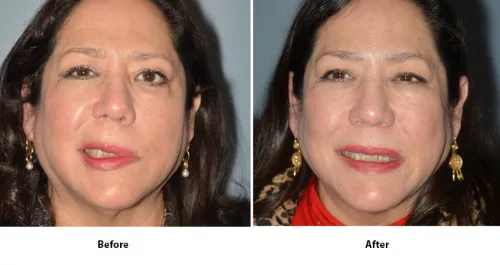Sixty-year-old Mary D. of Winthrop recalls waking up one morning two years ago over the New Year's holiday and immediately realizing something wasn't right. "My face felt a little funny," she says. "I was putting on makeup and couldn't close my eye correctly. By the end of the day, it was feeling much worse."
Mary's primary care physician was worried she had suffered a stroke and sent her to her local Emergency Room (ER) where she was diagnosed with a toothache and sent home with medicine to help the pain. Because of the holiday, it would be a few days before Mary could get an appointment with her dentist. By the time she saw him, one side of her face was paralyzed.
"My dentist quickly realized I had Bell's palsy," said Mary. "I was sent back to the ER, but I was told I had missed the window for medication that could help me. Since we were in the beginning of the pandemic he jokingly said, 'Don't worry. No one will see you because you have to wear a mask anyway.'"
That ER doctor's words stung, but he did give her a piece of advice she's grateful for – he suggested she see a specialist. By this time, she had to tape her eye shut in order to sleep, she couldn't chew her food properly and when she tried to drink the liquid would just pour out of her mouth.
"I didn't want to leave the house with my face like that," Mary said. "It was devastating to me and for a long time I was afraid I wouldn't recover."
Dr. Alexander Marston is a Facial Plastic and Reconstructive surgeon who heads the Facial Nerve Paralysis Clinic at Tufts Medical Center. The exact cause of Mary's Bell's palsy is unknown. "By the time I saw Mary, she had recovered a bit," says Dr. Marston. "This is common with Bell's palsy patients. Patients usually see partial or complete recovery, but many experience long-lasting spasms in their facial muscles. In Mary's case, there was asymmetry when she smiled with increased muscle tone/twitching around her eye, mouth and neck. This happens because some of the small fibers within the facial nerve can get crossed during the healing period."
Dr. Marston says he explained options to Mary including non-surgical treatments.
"It's important for patients to know that there are non-surgical means to improve facial asymmetry and spasm which can lead to a significant improvement in quality of life for patients who have incompletely recovered from Bell's palsy," says Dr. Marston.
PT, massage, warm compresses and facial yoga were all methods that helped Mary's condition improve.
"When I first saw him, my face was just dead," Mary recalls. "I was worried that I looked like a pirate when I went out to eat and I couldn't stop my eye from closing. Dr. Marston was just so kind and really took time to explain options to me. It was a game changer."
Also a game changer? Dr. Marston suggested adding periodic Botox® injections to Mary's treatment routine.
"Botox helps to reduce spasms and creates more symmetry to the face after Bell's palsy," explains Dr. Marston. "We customize the injection locations for each patient. Mary is getting injections about every 3 months and has seen further improvement since we added this treatment. It's also important to note that most insurers do cover Botox® in the setting of facial paralysis and Bell's palsy."

Mary says as impactful as the improvements have been, she is equally as grateful for the care she received from Dr. Marston. "The relationship with your doctor is so important," Mary said. "He never, ever rushed me. Dr. Marston is genuinely sincere. He would pull up a chair, talk to me and give me hope that I would get through this. Today, I feel that I look normal again, and that is thanks to him."
The Facial Nerve Paralysis Clinic at Tufts MC where Mary received treatment is made up of a multi-disciplinary team of doctors and specialists including Facial Plastic and Reconstructive surgeons, Neuro-otologists (ear surgeons), Head and Neck Cancer surgeons, Neurologists, Neurosurgeons, Ophthalmologists, Radiologists and Physical Therapists. To schedule a consultation, you can call 617-636-5511.